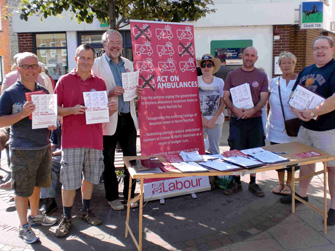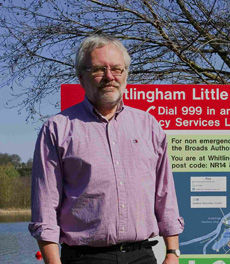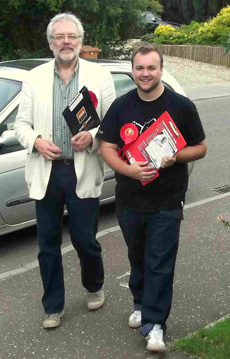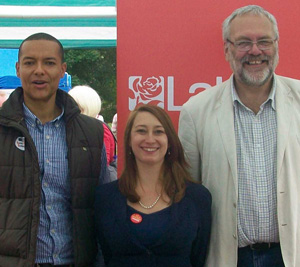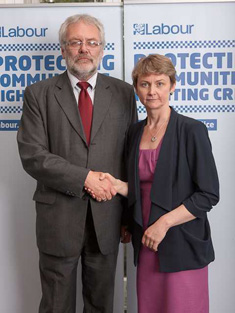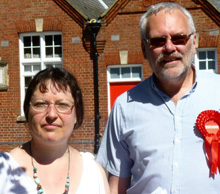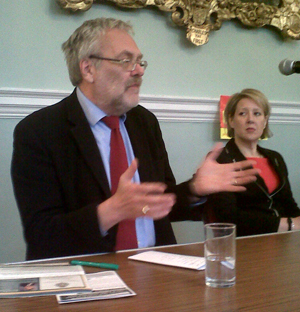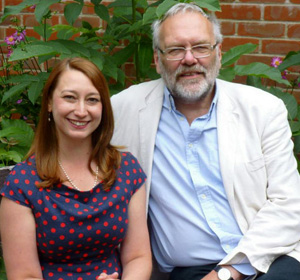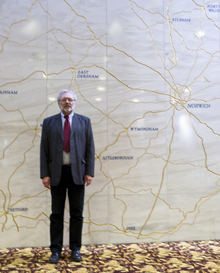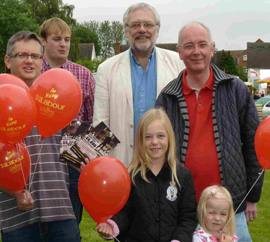
Your Peace of Mind - My Priority
Manifesto for the First Police and Crime Commissioner for Norfolk
On 15 November election for Norfolk's first Police and Crime Commissioner takes place and it's time we got down to the nitty gritty. Few people understand what the Police and Crime Commissioner will do and fewer still know what the policies of the declared candidates are. This manifesto for Norfolk reflects my policies and priorities.
What does a Police and Crime Commissioner actually do?
Police Authorities are past their sell by date - their work was never sufficiently transparent and they were not accountable to the public despite having tax raising powers. It is time they were replaced, but the timing is wrong and Police and Crime Commissioners are unlikely to provide the solution.
Establishing the new system is expensive at a time when front line policing is being cut. Despite my concerns about the concept of Police and Crime Commissioners they will play an important role
- setting priorities for policing
-appointing and removing the Chief Constable
- funding crime prevention initiatives
-setting council tax levels for police funding
But above all the Police Commissioner should be the voice for the community of our county on police, crime and peace of mind matters. There are opportunities, and we cannot turn out backs on policing and crime reduction just because we don't like the Police Commissioner role.
How I see the role of the Police and Crime Commissioner
For me police and crime are about feeling safe in our homes and on our streets - wherever we live in Norfolk. Our Police Force has an excellent record - but no one takes consolation from that if they are a victim of crime
Peace of mind is more than policing – It is about knowing how you are going to pay your bills, being able to rely on our NHS and having support if you can't manage alone are all equally important to living safely and securely. Working with councils and voluntary organisations can give the Police Commissioner a unique opportunity to contribute to wider social policy that both makes better use of police expertise and contributes to reducing the number of crimes committed and the number of victims needing support.
People like to see the police around their communities and neighbourhoods. If they feel safe they will be more confident to help the police. The police need the confidence and cooperation of the public, and if part of the deal is being seen to be visible then the public has the right to expect that.
There are many crimes that go unreported - we know for example that it can take many instances of domestic violence before the victim speaks up. There must be public confidence to report crimes - even though it means the figures appear to be worsening - if we are truly to get to grips with reducing the number of victims.
Preventing crime in our communities
Drugs, alcohol and mental ill health are major factors for many that police have to deal with. We must be careful not to stigmatise those with mental ill health - we know many ill people are arrested for want of satisfactory alternatives
We don't understand substance abuse or the role of mental ill health in criminal behaviour properly, we don't tackle them properly and the way organisations work together and with the police has huge scope for improvement. All those who work in the field know that is the case - but somehow the potential has not be realised in practice. When I was Leader of Norwich City Council we pioneered partnership working as part of the Safer Neighbourhood policy - which also led to Norfolk Constabulary being given the Freedom of the City of Norwich. There is a lot more that can be done.
One of the opportunities for the Police Commissioner to make a difference is in bringing those organisations and their expertise together in a coordinated way. The Commissioner will have a major role and budget to commission preventative services. I propose to develop a 'collaborative commissioning' model that will build involvement, consistency and will have the ability to differentiate between the priorities of different communities based on the needs and views of different parts of the county.
Many voluntary organisations that play a significant part in crime reduction and supporting victims are funded one year at a time for the work they do. The Commissioner will be taking over much of that funding - although it is far from certain that the funds inherited will be equivalent as it is widely anticipated the government will take the opportunity of this shift of responsibility to reduce funds.
Short term funding arrangements absorb resources, waste time, encourage short term thinking and leave expert staff always looking over their shoulders to see if they will have a job in a few months time. That must stop.
As far as possible commissioning arrangements will be set for the Commissioner's term of office subject to proper results being achieved. There will still be scope for specific short terms projects and initiatives, but these will not be used where longer term funding is appropriate.
Voluntary organisations are not an alternative to the police service, but they do play a crucial role in crime reduction, victim support and in our justice system. Neighbourhood watch schemes have always been a valuable way of building relationships between police and community to reduce crime. I support the increasing involvement of voluntary and community groups - but not in place of proper policing.
Impact of Funding Cuts so far
But..... government funding cuts have already cost Norfolk 115 Police and 21 PCSO's and many more are already planned to follow. That means every parliamentary constituency across Norfolk has lost over 15 uniformed police. There has been no outcry, but it is easy to imagine the celebrations had there been an increase of the same proportions.
Many are predicting further dire funding cuts as the economy fails to respond. It is always possible to do different and better, but the margins reduce and the benefits start to become less significant compared to the costs of making the changes. The Commissioner will have to articulate the policies developed in collaboration and fight for the funding from government - not simply move the deckchairs around. Having a Police and Crime Commissioner used to lobbying government departments and familiar with the way public sector funding works will be a major benefit, especially as the tight timescale and new role will mean a steep learning curve and swift, critical decisions need to be made.
I am used to making decisions under pressure, handling major funding decisions and working with partners to get decisions made and implemented.
Opposing Privatisation
The existing Police Authority is to be applauded for setting its face against privatisation - and I invite other candidates to express their views clearly. After the fiasco of G4S at the Olympics, the highest profile event in the world with a huge budget and massive security risks, how can we really be expected to have confidence if those responsible for our safety and wellbeing are accountable to shareholders above the public they serve?
It has becomes established practice that one off events retain their own stewards. That does not affect policing or crime reduction, not does it affect the accountability of the police to the public. Of course the police service buys in goods and services from the private sector and will continue to do so - we won't make our own cars, computers or coffee cups.
But I will not countenance the extension of the private sector into any front line or police support services currently undertaken by officers and staff whose accountability is to the public. There will be no reduction in public accountability and never will the interests of private shareholders be in a position where they might clash or take precedence over accountability to the public.
In simple language - no police privatisation.
Operational Independence
The Police and Crime Commissioner cannot and must not interfere with operational policing. That is easy to say and we can expect many of those who glibly say it to try to interfere as soon as they are elected. I have worked with professionals in the NHS, local government and other fields. When a non executive director of the Norfolk and Norwich hospital we set priorities for clinicians and held them accountable - but never did I dream of picking up a scalpel or syringe. That was of course for the trained and qualified professionals. The same principle applies to policing.
I am experienced in respecting professionalism and expertise - being clear what result I am looking for and expecting, taking advice and debating options, and then letting people get on with what they are good at and holding them to account. That also means praising a job well done - and I praise the Norfolk Constabulary for a job they are currently doing very well given the circumstances facing them.
The relationship between the Police Commissioner and the Chief Constable is key to success and a poor relationship will be damaging. The effect on morale of the police service of attacks on terms and conditions, pensions and status of the police is profoundly damaging. It is difficult for police officers as crown servants to express their concerns in the ways open to those in other professions, and even police staff are limited in their ability to speak out.
An early priority must be to establish the right relationship with those who serve the public in our police service, always respecting the Chief Constable as the head of operational policing. I will regularly spend time with officers and staff at all levels to listen to and understand their concerns. Over time we will develop protocols to ensure that relationship is one where concerns are respected and action taken if possible, or an explanation given.
This is uncharted territory and predicting the course of this new relationship is unwise. However, it needs to be positive and my experience of working with the police has always been one where positive relationships have been built even where the issues have been tough.
Uncertain futures and funding
We don't know what is coming next from the government. Their economic policies are not delivering and the way they respond may be a further attack on public funding for key peace of mind services. Whatever the direct correlation between increased poverty and crime, we know that people under pressure are more likely to suffer mental health problems, and also take solace in drink and drugs - key drivers of criminal acts. The likelihood is that crime will increase at the same time as the ability of the police to cope will diminish. There are ways to work more efficiently - but there are limits and change takes time.
That will mean grasping the nettle of increasing council tax precepts to fund policing. I do that reluctantly in the current circumstances where families are counting every penny and will not increase council tax unless it is necessary, but I am not going to pretend that that looks likely.
My council tax pledge is that the annual increase will be limited to no more than 10p per week (at Band C) for each of the four years of my term.
As long as the government don't hack away huge amounts more from the budget, increases of that amount each year together with the efficiencies that can be generated should mean front line police services can be protected.
Victims
Crime affects people, communities and businesses. It can, and does wreck lives. Whilst my absolute priority will be to reduce crime and therefore reduce victims, when crime does occur, I will work to ensure that victims receive the support and help they need.
I am proud therefore to commit to Victim Support's five promises to victims of crime; to be open and accountable to victims, to provide high quality support, to maintain the police's victim focus, to give victims a voice and to work to develop new ways to deliver justice to victims.
I will appoint a senior member of my team to be Norfolk's Victim Champion to ensure these pledges are met and will work with all appropriate organisations that work with victims.
I am committed to increasing the use of restorative justice and will, where possible, look for opportunities to increase victim involvement.
Working with Suffolk
I applaud the close working relationship with Suffolk. The introduction of Police Commissioners may make it harder to develop cross county working but I will do all I can to champion this as cost efficient, but more importantly a way of providing real expertise in areas of crime that would not be required in one county on our own. I don't rule out amalgamation ultimately - but not for the foreseeable future and only after residents have had a proper say.
The relationship between the Commissioners for Norfolk and Suffolk will be important in how this develops. The political persuasion of the successful candidates for both areas should not be a barrier and I will work closely with the Police and Crime Commissioner for Suffolk whoever it is .
Fair shares in policing
Whether you live in a rural area, in a market town, coastal area or city you are equally entitled to peace of mind. How that is achieved will vary but the end result should be the same - feeling safe in your home and on your street.
It isn’t possible to have a police presence in every village across the county. Here are five initiatives to help ensure the voice of rural communities is heard >as loudly as those in urban areas
1. Developing close links with parish and town councils with an invitation for them to act as a conduit to the Police and Crime Commissioner for local views of crime prevention and policing policy
2. Regular local surgeries in each of the district council areas to enable residents to come to speak directly to the Commissioner
3. An initiatives fund to provide small grants to enable activities that will contribute to crime prevention
4. An innovation panel made up of residents and representatives of rural organisations to look at best practice and new ideas for tackling rural crime
5. Support for Rural Watch and Home Watch type schemes to ensure people feel there is help available should they need it
My Pledges
I would be foolish to pretend the position is clear enough to make promises I am sure I can keep. This is a new role with too many unknowns, a weak economy and uncertain, hostile government policy. But as I am asking people to trust me with their vote I must set out the things I pledge to try to achieve, the values that underpin them and the things I expect to be judged by. If I am not going to be able to do the things I say, the Norfolk community is entitled to know and have a say in the alternatives.
This is a summary
- Council tax police precepts will increase by no more than 10p per week (Band C) in each year of the four year term
- There will be no use of private sector companies to provide policing services currently delivered by those responsible to the public - no police privatisation
- Support for victims will be in line with the five pledges sought by Victim Support
- Be open and accountable to victims and witnesses, seeking out and acting on their views.
- Ensure that victims and witnesses get the high quality help and support they need, when they need it.
- Make the police more victim-focused and more effective at their needs.
- Give victims and witnesses an effective voice in the wider criminal justice system.
- Constantly work to develop new ways of delivering justice for victims.
- Rural communities will enjoy equal rights to peace of mind measures and police contribution to achieving local priorities
- Measures to combat major drivers of crime and anti social behaviour - alcohol, drugs and mental illness will be an enduring priority throughout the term. Policies will be developed and implemented between agencies, the NHS and council together with the police for reducing crime. We will develop the principle of 'collaborative commissioning' to implement those policies.
- I will fight further cuts in government funding for policing whilst seeking to drive out further efficiencies through better working - without reducing services to the public
- I will prioritise 'peace of mind' - which means seeking to influence other aspects of social policy that affect peoples wellbeing. That will include the supporting activities for younger people, support for other emergency services and support for vulnerable people especially in tackling hate crimes.
- I will respect the operational independence and professionalism of the police service and hold them accountable through the Chief Constable against standards set by the policing plan, independently, and the principles of fairness and justice.
- Support for neighbourhood policing - working visibly at community level to tackle the concerns of local people - will remain at the core of delivering police contributions to peace of mind initiatives.
- As the first Norfolk Police and Crime Commissioner I would develop the role as the champion of the peace of mind of local people and demand the highest standards for all - not be an apologist for any organisation or political dogma that acts against the interests of Norfolk people
About me
I have been a Labour politician in Norfolk for 25 years - my allegiances are clear and undeniable. The positions I have held have required me to work closely with members and representatives of all parties and none, and from people from all strata and sectors of society. In common with most who hold senior positions I have found much more that brings us together than divides us.
Most people want to do right for their community, though there are different values, approaches and priorities. My experience in working with people of differing views and getting things done sets me apart as a candidate with experience of working in partnership in Norfolk.
I was on the Board of the Norfolk and Norwich University Hospital Trust when we built the new hospital and chaired the Audit Committee for six years. I led the financial turnaround of Norwich City Council that has become a case study in how to rescue a failing council without cutting front line services -whilst leading a minority administration. I helped shape the new Local Strategic Partnership, was responsible for a ground breaking partnership with the Homes and Communities Agency and worked closely with South Norfolk, Broadland and Norfolk County Council to agree how development of the Greater Norwich area should proceed. I was shortlisted for a national award for partnership working - it is how I operate.
I was proud to be the Leader of Norwich City Council who proposed to the council that Norfolk Constabulary should receive the Freedom of the City of Norwich in recognition of the role played by the police in the city and the partnerships we had developed, especially in Safer Neighbourhood Teams. I was part of transforming the relationship between city and police and proud to speak on behalf of the city at the ceremony where the Lord Mayor of Norwich presented the scroll to the Chief Constable.
The challenges of the Norfolk Constabulary - well led and successful, but beset by funding cuts, attacks on police terms and conditions and the imposition of Police and Crime Commissioners - are vast. This scale of change, in the public sector, in the public eye and the jaundiced and sceptical gaze of the police themselves is not for the inexperienced or the faint hearted. I have the skills and experience - learnt and applied in Norfolk - to hit the ground running and start to tackle those challenges on behalf of Norfolk people.
Full time commitment - no deputy commissioner
I have never seen myself as a full time politician - always having a job or running my business as my main means of making a living. However the Commissioner is a full time role with a substantial salary. I will treat it as a full time job with no other employed commitments.
I have worked in human resources for 40 years - 20 as a full time trade union officer and since then as a human resources consultant working mainly with voluntary sector organisations and charities - mostly in Norfolk. I have been on the board of a number of charities in the past and I currently volunteer for Future Radio presenting a programme called 'The Best of the Blues'. I hope to be able to keep my roles with Future and as a serving member on Employment Tribunals if elected - but not if they interfere with my work as Police and Crime Commissioner.
I will not appoint a deputy unless and until I see there is a proper role for a deputy. At the moment it feels like expensive window dressing or a job for the sake of it. If it proves over time that there is a role I will invite people to apply, not treat it as a party political placement.
Steve Morphew Labour Police and Crime Commissioner candidate for Norfolk
